TECHNOLOGY
Sustainable innovations for growth
The IT industry of India has grown from a few million dollars in the
1990’s to $ 50b in 2009 contributing to 5 percent of the GDP while the
industry is projected to grow to $225b by 2020, said Chairman Accenture
India Harsh Manglik.
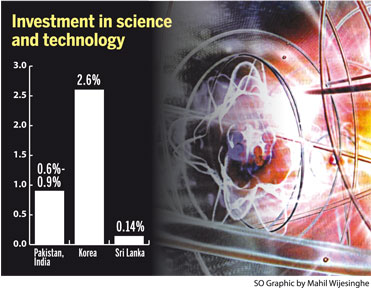 He said that NASSCOM a global trade body with more than 1200 members,
(which include both Indian and multinational companies), has a presence
in India, with over 95 per cent of industry revenues in India and
employing over 2.24 million professionals. He said that NASSCOM a global trade body with more than 1200 members,
(which include both Indian and multinational companies), has a presence
in India, with over 95 per cent of industry revenues in India and
employing over 2.24 million professionals.
Manglik said that low paid highly educated people were the start of
the industry “but we in the industry understand that this is not
sustainable.
India is appreciated as a country with a high quality talent pool. We
as a nation keep moving up the ladder as standing still will make us
vulnerable to external shocks.”
“The IT industry is a central source of foreign exchange. For example
for every direct job there are 3-4 indirect jobs created and in metro
India we are the largest supplier of jobs.
The industry has created a new model of entrepreneurship people who
are educated in the west and who do not heed bureaucracy,” said Manglik
addressing a AMCHAM meeting themed ‘How Innovation Supports
Sustainability.’
The younger generation of today has a profound sense of
responsibility and the IT industry has taught them that they are second
to none.
India is a very young country as half of its population is less than
24-years-old while one third is less than 50 years of age which gives
India an edge over other countries.
He said that 80 percent of the growth in the IT industry comes from
new applications and industries while the balance is from traditional
work in the industry. More than 700m of the population live in rural
areas therefore ICT can be used to make their life comfortable through
e-learning and tele medicine.
The developing of the IT industry has given inclusion of access,
inclusion of opportunity and the quality of enableness which support
inclusive growth and can be experienced by all Indians.
Sri Lanka too has a great future with peace dawning on the country in
addition to the highly literate talent pool.
CEO Sri Lanka Institute of Nano Technology (SLINTEC) Ravi Fernando
said countries who have and are investing in innovation will be the
leaders in the future. Therefore it is time for Sri Lanka to forge ahead
as a innovative nation leaving behind the commodity exporter status
which the country enjoyed for sixty years.
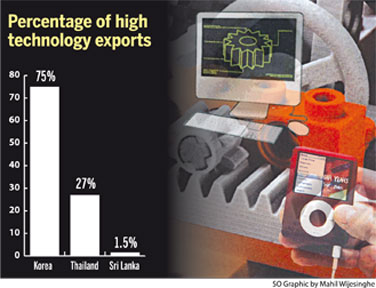 He said that the USA started the Nanotechnology Institute in 2000 and
92 countries followed. Sri Lanka fortunately is not far behind as we
launched (SLINTEC) in 2008. He said that the USA started the Nanotechnology Institute in 2000 and
92 countries followed. Sri Lanka fortunately is not far behind as we
launched (SLINTEC) in 2008.
At present SLINTEC is working with five companies namely Hayleys,
Dialog, Brandix, MAS and Loadstar.
Its main aim is to be a sustainable nanotechnology company that will
never compromise environment sustainability and will always start a
project with the end in mind.
He said that most of the companies drive shareholder value creation
rather than sustainable value creation but of late the world is shifting
towards sustainable value creation.
He said that there is a difference of about 70-80 points between
shareholder value creation companies and sustainable value creation
companies.
He said that for many years the world has practised unsustainability
and therefore moving towards sustainability is a must today.
Fernando was of the view that businesses are for long term therefore
practising sustainable innovations will help the country attract more
investments and grow faster.
SG
IBM launches Smarter Business for a Smarter Planet
by Gamini Warushamana
IBM is ready to provide business management consultancy services to
government institutions and business organisations in Sri Lanka and
outsourcing contracts for business management, said Country General
Manager IBM, Chrishan Fernando.
Last week IBM launched its Smarter Business for a Smarter Planet
initiative in Colombo at IBM Forum 2010 with participants from nine
countries in the region. Latest IBM technologies were demonstrated at
the Forum and most of them for the first time in Sri Lanka.
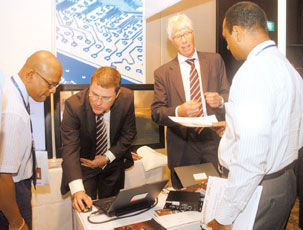 |
|
IBM displayed its
latest technology at IBM Forum 2010. |
Vice President (Operations) India and South Asia of IBM Amith Sharma
said that for a smarter planet we need smarter governments as well as
smart businesses.
The IBM smarter planet initiative is neither software nor hardware.
It is a vision that heads businesses for the future and a management
service with which IBM shares its global expertise and long years of
experience.
We have created smart cities in China and Japan. We helped Indian
railway to be smart introducing technology to make the service
efficient.
Our transportation solutions provide smarter management of traffic by
intelligent routing of traffic. In Singapore it reduced fuel consumption
by 20 percent, Sharma said.
It is the most efficient use of technologies available.
In the last few decades the world has invented a lot of instruments.
They also have inter connectivity and the instruments can talk to
each other. Therefore we have the ability of analysing data and support
to make important decisions.
But this analysing part is not happening in businesses. According to
researches eight out of ten CEOs do not have correct information to make
decisions.
For instance analysing data related to diseases can be used for
preventive programs and thereby insurance claims can be reduced.
In the power sector globally billions of dollars are wasted by
generating energy that never reaches a single light bulb.
IBM has smarter energy management solutions.
In IT the average IT server only uses 6 percent of its capacity and
smarter planet needs smarter IT systems and IBM has solutions, Sharma
said.
We hope Sri Lanka can become smarter faster because growth in the ICT
sector in Sri Lanka is impressive. However, you should start from one
point and then it will be followed by others.
For instance if city A started a smarter traffic management system
other cities will follow.
IBM is a product company but today most of the revenue we earn is
from services.
IBM has been in Sri Lanka for 50 years and we are strong in banking,
finance and telco sectors. IBM can start smarter banks or smarter telcos
in Sri Lanka with our solutions.
This initiative is not limited to any particular industry and we are
ready to provide solutions to any sector Sharma said.
WSO2 celebrates fifth anniversary
WSO2 celebrates five years of creating a global brand and in a
continued effort to put Sri Lanka on the forefront of technology, will
celebrate its fifth anniversary by organising WSO2 Con to be held in
Colombo.
WSO2 has established itself as the complete open source middleware
platform for Service-Oriented Architectures (SOA), The co-founders Dr.
Sanjiva Weerawarana and Paul Fremantle are both ex-IBM.
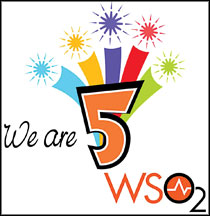 WSO2 has grown into a global corporation with its main operations arm
in Sri Lanka and offices in the US, UK and Australia. WSO2 has grown into a global corporation with its main operations arm
in Sri Lanka and offices in the US, UK and Australia.
Acknowledged as leaders in XML and Web services technologies, open
source, and open standards, WSO2 employs almost a hundred innovative
thinkers in the country.
“Five years ago we had a vision that enterprise applications would be
built using a distributed, compositional approach, talking to each other
with open standards. As well as providing a solid, high performance
platform for compositional applications, WSO2 has also created a new
kind of modular, cloud-native platform to provide a vision for the next
five years.” said CTO, Paul Fremantle.
Encompassing the breadth of enterprise middleware capabilities by
hosting core services, WSO2 Carbon provides everything required to build
a modern enterprise application in a simple and quick manner.
WSO2 Stratos allows these applications to be deployed on public or
private cloud infrastructure. The web based console allows easy access
and configuration of middleware applications within an organisation, so
the provisioning of a new application becomes a simple self-service
process.
WSO2 credits its success to great team work, passion and commitment,
resulting from modelling the organisation around a strong commitment to
human development and an employee-centric work environment.
“We have built a global brand and a superb set of technology that our
customers absolutely love! All this by a team of very young people who
took the challenge to heart and simply made it happen,” said Weerawarana.
All team members are encouraged to actively contribute towards every
aspect of the company by communicating openly without fear.
This in turn nurtures WSO2’s sense of working in small, integrated,
global teams that has helped take problem solving and innovation to a
whole other level. The great team work and group cohesion has helped
WSO2 successfully compete against industry giants such as IBM, Tibco and
Oracle.
Finacle for HNB
Infosys Technologies Ltd. (Infosys) and Hatton National Bank Plc (HNB)
successfully implemented Finacle universal banking solution across HNBs
operations in Sri Lanka.
Infosys has implemented Finacle core banking, treasury and consumer
e-banking solutions across 191 customer centres of the bank.
HNB now operates its entire banking operations on Finacle to support
over 2.8 million customers.
Managing Director and Chief Executive Officer, Hatton National Bank
R. Theagarajah said, advanced core banking technology is important to
achieve our business growth objectives and improve customer service.
We selected Finacle for its global leadership, committed investment
in research and development in core banking and unmatched delivery track
record.
Finacle has provided higher scalability and flexibility to service
our diversified retail, institutional and corporate clientele.
Our new back office platform provides greater agility by
consolidating disparate systems and reduced turnaround times, enables
innovation to launch new offerings, and empowers staff to radically
improve our customer service.
Samsung launches two smartphones
Samsung launched two smartphones Samsung Wave and Samsung Galaxy S to
the Sri Lankan market last week.
The two next generation smartphones are equipped with Samsungs
proprietary ‘open’ mobile platform ‘bada’.
The new smartphones provide the ‘bada’ of experience and will reach
the largest section of consumers, said Samsung Country Manager Shankar
Narayan. In Korean language ‘bada’ means the ocean.
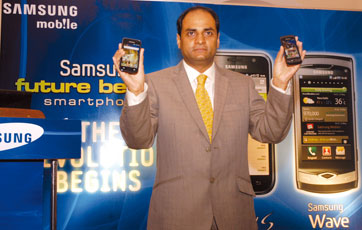 |
|
Shankar Narayan with
the phones
Pic: Chintaka Kumarasinghe |
Samsung the number two mobile phone brand in the world aims to catch
25 percent of the smartphone market in Sri Lanka. Already 17 percent of
world hand phones are smartphones and it will increase to 22 percent by
the end of next year.
Smartphone has made the mobile phone much more than communication
tool.
It has integrated consumer needs and is the next level of social
networking. Mobile social networking is at 9 percent today and will
increase to 11 percent in the next year.
Samsung is committed to make smartphones available to everyone, he
said.
“We have been focusing more on open OS mobiles recently since many
key characteristics of smartphones are becoming increasingly important,
especially mobile internet, messaging features, strong third party
applications and flexibility for customization. In the open OS area, our
strategy is to be there with whatever customers want. That is the reason
we are offering mobiles based on the Android, Windows and now the ‘bada’
platform in the Sri Lankan market,” Narayan said.
Samsung Wave is the first smartphone with Samsung’s own proprietary
operating system ‘bada’ which allows mobile users to simply and easily
down load an abundance of applications from Samsung Apps, an integrated
application store accessible from the device and on line.
Featuring a vast selection of games, social networking, health and
lifestyle applications Samsung Apps gives users instant access to a huge
choice of mobile experiences.
Samsung Wave has 3.3” super AMOLDE display, integrated HD video
player and recorder, Dolfin web browser and 1GHz processor.
Samsung Galaxy S has the power to enrich people’s lives through its
best-in-class services and technologies. It introduces the Smart Life
concept.
The smartphone experience that is simple, organised and integrated
enriches the lives of the users. Galaxy S featured 4-inch Super AMOLED
screen, a 1GHz application processor and TouchWiz 3.0 user interface.
Smartlife is further enabled through intuitive, integrative features
including the Swype text input service, the rich augmented reality
browser, Layar, Social Hub Integrated Phonebook, Downloadable EBook,
Think Free Office, Wireless Tethering and the powerful Android 2.1
operating system, Narayan said.
GW
|

